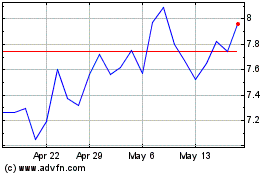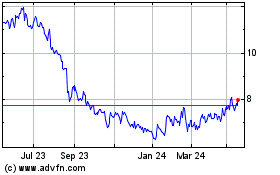Australian mining companies fell sharply Monday as investors
factored in lower earnings for the companies after the government
said Sunday that it plans to introduce a 40% tax on the industry's
profits.
Analysts cut target prices and earnings estimates for many of
the firms and said that the proposed Resource Super Profits Tax
could cause potential mergers and acquisition suitors to reassess
their valuation of target companies.
Credit Suisse analysts said that the proposals could force the
country's two largest miners, BHP Billiton Ltd. (BHP) and Rio Tinto
PLC (RTP), back to the negotiating table on their proposed A$116
billion joint venture to combine their iron ore assets in Western
Australia's Pilbara region.
"We are still committed to the joint venture. We are assessing
the impact but it is a bit early to say," a BHP spokeswoman said
adding there is "still a great deal that is unclear" about the
detail of the tax changes.
Rio Tinto wasn't immediately available for comment.
Mining companies were still digesting the implications of the
plans, which came as part of a review of Australia's entire
taxation system which will also see the country's headline
corporate tax rate reduced to 28% from 30%.
Royalty payments that mining companies currently pay to state
governments will also be rebated as part of the proposals, reducing
the net effect of the tax changes below the headline rate of
40%.
But, combined with company taxes and after allowing for
extraction costs and recouping capital investment, companies will
pay a statutory rate of around 58%, according to a Treasury
estimate.
The proposals still have to pass Australia's parliament, where
several recent major laws have failed to get through the Senate,
where the government lacks a majority.
Opposition leader Tony Abbott told Australian Broadcasting Corp.
radio on Monday that he was "deeply hostile" to the plans, but
refused to say whether he would oppose the laws in the Senate.
Miners nonetheless suffered a savage sell-off in morning trading
in Sydney.
At 0240 GMT, Rio Tinto was down 3.4% at A$69.65 and BHP was down
2.7% at A$39.65. Macarthur Coal Ltd. (MCC.AU) was down 7.4% at
A$14.32.
Macarthur, which has been the subject of a takeover bid by the
U.S. miner Peabody Energy Corp. (BTU), could see its suitor's plans
hit by the tax review's impact on its valuation, according to
Macquarie analysts. "The prospective fall in (Macarthur's) net
present value...is likely to see Peabody reassess its estimate of
'fair value'," Macquarie said.
Australian mining companies have been the subject of a string of
mergers and acquisitions bids over the past year, driven by the
rebounding value of commodities and expectations of future demand
from China.
Many of these deals were likely to be put on ice until the law
is finalised, according to one Australia-based M&A expert for a
major international investment bank, who asked not to be named.
The details of the tax will affect the profitability and
valuations of target companies on which takeover pricing decisions
are made, making it hard to reach final decisions until the
legislation is inked.
But while the profit cuts would hurt local companies' ability to
take over foreign rivals, it wouldn't necessarily damp overseas
companies' appetite for local assets to the same extent. "It will
make Australian companies less competitive internationally but for
international companies looking inwards it won't change as much,"
he said.
Initial sharp falls in share prices had recovered somewhat by
late morning. The slide had been "at the upper end of what we'd
been expecting," said Brendan Fitzpatrick, a mining analyst at
Deutsche Bank in Sydney.
Deutsche Bank estimated that the new rules would hit sector
valuations by 7%, a reduction which should already be at least
partially factored into share prices.
"After completing the detailed analysis it wasn't as detrimental
as it appears on the first review," he said, citing the fact that
the introduction of the changes will be pushed back to 2012; the
rebate of state royalties; the reduction in the main corporate tax
rate; and the fact that depreciation and amortisation will not be
included in the tax calculation.
Companies with large numbers of offshore projects and in an
early stage of development would be likely to fare best, he said,
as the taxes will only hit profits, rather than revenues, from
Australian mines. However, overseas companies with significant
Australian operations will be affected.
Mick Davis, Chief Executive of Anglo-Swiss mining giant Xstrata,
said that under the plan, Australia would have the highest taxes on
the minerals sector anywhere in the world.
"(It) will result in significant and disproportionate additional
taxation on the industry and could well curb the large scale,
long-term investments required to develop Australia's natural
resources for the benefit of all Australians," Xstrata said in a
statement.
For energy companies, the new tax is set to hurt those with
onshore assets.
Australian oil and gas producers are already subject to the
Petroleum Resource Rent Tax, which is at a rate of 40% of company's
taxable profits.
"It's almost like everybody else catching up to where we're at,"
said Woodside Petroleum Ltd. Chief Executive Don Voelte.
Santos Ltd. (STO.AU) has a large quantity of assets onshore in
Australia's Cooper Basin and along with Origin Energy Ltd. (ORG.AU)
it wants to convert vast onshore coal seam gas reserves in
Queensland state into liquefied natural gas for export.
Santos shares were down 3.9% at A$13.30 and Origin was down 1.3%
at A$16.16.
The Australian government said projects within the scope of the
PRRT can elect to transfer into the RSPT and that it anticipates
that many projects will make the transition over time.
-By David Fickling; Dow Jones Newswires;
david.fickling@dowjones.com
(Rebecca Thurlow, James Glynn, Ross Kelly in Sydney and Neil
Sands in Melbourne contributed to this article)
Iluka Resources (ASX:ILU)
Historical Stock Chart
From Apr 2024 to May 2024

Iluka Resources (ASX:ILU)
Historical Stock Chart
From May 2023 to May 2024
